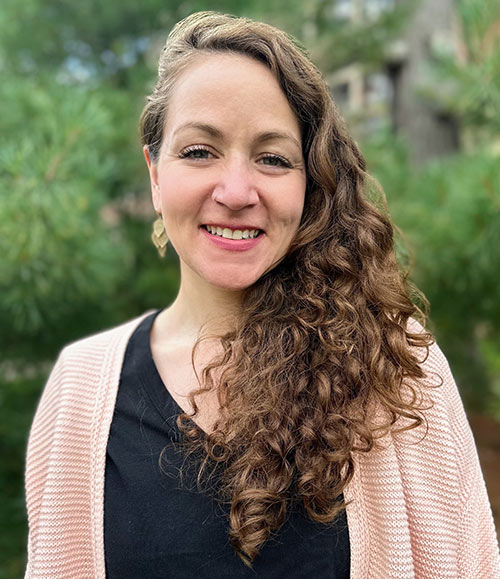New Clinical Science Faculty: Dr. Blair Burnette
September 19, 2023 - Shelly DeJong
 The Michigan State University Psychology Department welcomes Blair Burnette, Ph.D., as a new assistant professor in the Clinical Science program.
The Michigan State University Psychology Department welcomes Blair Burnette, Ph.D., as a new assistant professor in the Clinical Science program.
Dr. Burnette, who earned her doctorate from Virginia Commonwealth University, comes most recently from a postdoctoral fellowship at the University of Minnesota and the School of Public Health, specifically in the Epidemiology and Community Health division. Dr. Burnette’s research explores the forces that shape how people feel about eating and their bodies, weight bias in healthcare settings, and intuitive eating.
“I’m excited to be joining this impressive team of researchers who have done groundbreaking work in their fields,” said Dr. Burnette. “They are excellent scientists but are also friendly, welcoming, and collaborative. I’m excited to have them as colleagues, to learn and work with them.”
Dr. Burnette attended Kenyon College for her undergraduate degree in Psychology. While there, she worked with several esteemed researchers in the body image and eating disorders field. This experience solidified her interest in the field and fueled Dr. Burnette to earn a Ph.D. in Counseling Psychology.
An internship with West Virginia University in Charleston led to her interest in the intersection of public health and psychology. Dr. Burnette remembers realizing that her clients at a disordered eating center were swimming upstream against all the social, cultural, and environmental forces working against them as they tried to learn.
“Eating and having a body in our culture is hard for almost everyone,” said Dr. Burnette. “I work to address some of the systemic and social factors that influence that. We need to develop multi-level interventions that can help make the world a more hospitable and equitable place to eat and have a body.”
Weight Bias in Healthcare
Through her internship, Dr. Burnette started to see how many of her clients had negative healthcare experiences. Dr. Burnette recalls one patient who had internalized that they had caused their cancer after a surgeon told them it was their fault. Other patients reentered the dieting cycle after being told they would die if they didn’t lose weight. These patients were often left feeling shame instead of focusing on their healing.
“There’s so much research that shows shame is not an effective motivator. I’ve gotten really interested in weight-inclusive or weight-neutral approaches to healthcare where we take the emphasis off weight and instead try to equip people with the supports and services that they need,” said Burnette. “So, if someone is experiencing food insecurity, we connect them with services instead of putting the emphasis on weight loss.”
Earlier this year, Dr. Burnette finished collecting data for a project where she and her research team interviewed and surveyed primary care team members to figure out what would be needed to pilot a weight-inclusive approach to primary care for adults. The next phase of the project will be to implement this pilot in a small trial to demonstrate that it's a safe and feasible approach.
“Trying to change how healthcare is delivered is not a small thing. But to me, it's important that we stop putting the burden on the patients. We’ve been centering weight in health care for decades and it hasn’t helped people,” said Dr. Burnette.
Intuitive Eating
Another big part of Dr. Burnette’s research is intuitive eating. She has seen mainstream interest in intuitive eating grow over the years, and yet intuitive eating training for professionals is expensive and not very accessible.
“It’s normative to have some degree of distress or complications around body image and eating in our culture,” said Dr. Burnette. “Although it may vary person-to-person, in theory, we have the hardware to regulate our eating. But when it comes to hunger and fullness, we get very cognitive instead of trusting our body cues.”
With this in mind, Dr. Burnette is currently working on a book for equipping clinicians and healthcare professionals to work with patients on intuitive eating. The guide is laid out as a 10-session intervention that will cover intuitive eating principles and can be delivered in a group or individual sessions. Dr. Burnette aims for the guide to be adaptable and inclusive.
Dr. Burnette’s book is scheduled to be published next year.

